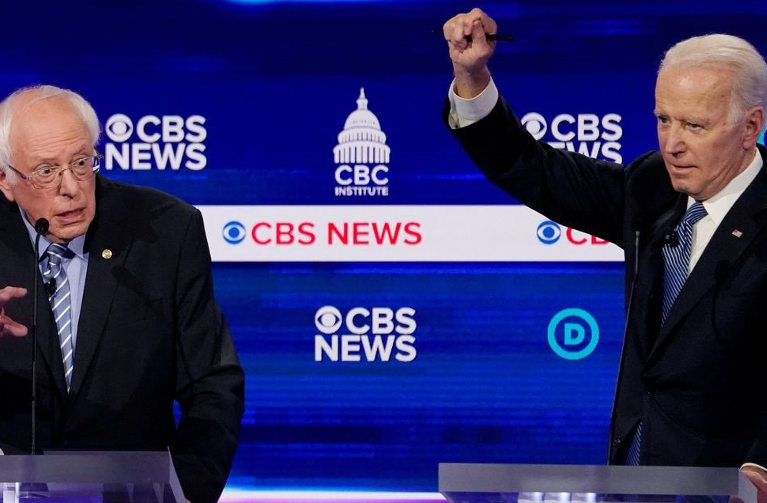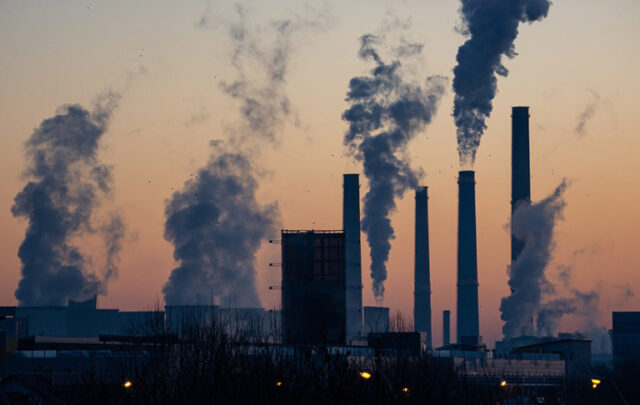In a brief statement that sounded more like a negotiating tactic than a concession speech, Senator Bernie Sanders announced he’s staying in the race for the Democratic nomination for president—at least for a few more days. The statement followed bruising primary losses in states like Michigan, Texas, and Virginia that he needed to win to prove his electability.
Sanders qualified his remaining in the race at least through the head-to-head debate with former Vice President Biden scheduled for Sunday, March 15th. The debate is in advance of the St. Patrick’s Day primaries in four states critical to a Democratic victory in November. Together, Ohio, Florida, Illinois, and Arizona, account for 577 delegates—over a quarter of the 1991 votes needed to win the nomination on the first ballot.
The Senator has no illusions about his probable defeat at the hands of Biden and the Democratic establishment. His willingness to engage Biden in the Sunday debate and forewarn him of what he intends to debate him about is, for all intents and purpose, an attempt to negotiate consolation prizes for the progressive wing of the Democratic party in a very public forum.
Sanders is right–he will never be in a better position to impact the Democratic platform on which Biden and the party will run in the 2020 elections. Although Sanders’s socialist democratic agenda should find favor in each of the four upcoming primary states because of demographics, he handily lost to Clinton in all of them in 2016.
Today’s polls hold little promise for Vermont’s junior Senator. Losses or near-wins on St. Patrick’s Day 2020 would only decimate further Sanders’s standing within and without Democratic circles.
Reacting to Sanders’s poor performance in the March 10th primaries Representative Ocasio Cortez (AOC), a prominent Sanders surrogate, was her usual blunt self: There’s no sugar-coating it. Tonight’s (March 10th) a tough night…a tough night electorally.
AOC took the occasion to declare a generational victory and encourage all socialist democrats to leverage their potential support for Biden into bold policies that can influence mainstream Democratic politics.
Attempting to do what AOC said couldn’t be done, Sanders sugar-coated his decision to remain a Democratic contender by referencing his popularity with “two enormously important areas which will determine the future of our country.”
Poll after poll, including exit polls, [show] that a strong majority of the American people support our progressive agenda. We are winning the generational debate.
Today I say to the Democratic establishment: In order to win in the future, you need to win the voters who represent the future of our country. And you must speak to the issues of concern to them.
Highest on the list of issues he intends to question Biden come Sunday is the environment:
Joe, how are you going to respond to the scientists who tell us we have seven or eight years remaining to transform our energy system before irreparable harm takes place to this planet because of the ravages of climate change?
Other Joe-questions Sanders will ask are on the issues he’s consistently campaigned on, including healthcare, student debt, and social justice.
Biden’s answers in Sunday’s debate could give Sanders and his supporters what they need—an honorable and plausible way to transfer their allegiance from the Senator to the former Vice President. The grace with which Biden answers Sanders’s questions could well determine the outcome of the 2020 elections and if Sanders will continue to be viewed as the titular head of the progressive pack.
I’ve written before that many of Sanders’s 2016 supporters voted for Trump or simply didn’t bother to show up at the general election, after his loss to Clinton. Van Jones, fearing a Pyrrhic victory for Biden should Bernie supporters repeat the pattern of the past, asks what should be done with the people that you defeat?
Jones sees Sanders’s core supporters as a defeated insurgency, who are losing their champion because of the establishment having banded together behind a Not Bernie. He calls upon Biden and the Democratic establishment to open their arms wide enough to enfold young progressives.
As essential as the question of what do you do with defeated insurgents is what will they accept as a reasonable offer given today’s political realities? Possible divisions are already forming in the ranks of climate defense groups.
The political arm of the six million-member National Wildlife Federation has just announced its endorsement of Biden. Collin O’Mara, CEO of the NWF, stated that the organization feels strongly that it’s going to take a leader that can bring everybody together to find durable solutions, and the Vice President has the best track record of that. Other climate defenders like 350.org and The Sunrise Movement continue to withhold their endorsement of the establishment’s candidate.
The Sunrise Movement was quick to contact its members following Sanders’s loss in Michigan and the other March 10th primary states. In their communications, the group highlighted Sunday’s coming debate and affirmed the Green New Deal (GND) as their primary mission. They also implied a threat should Biden and establishment Democrats not choose their policy options “wisely:”
Whether Bernie knocks Biden out in the one-on-one debate this Sunday and makes a huge comeback or he decides he’s out for the count, our mission doesn’t change.
The lines have been drawn. The Democratic establishment can repeat the mistakes of the past and make us all suffer for it, or they can answer the call for a Green New Deal…. It’s time for the Democratic establishment to choose…. (emphasis added)
There’s a yawning divide between what an organization like the NWF considers a reasonable position on climate defense and the GND. The $1.7 billion (over a decade) climate plan that Biden has put forward is a long way from Sanders’s $16.5 billion proposal. A crucial difference is Biden’s date of 2050 for the nation to become a net-zero emitter of greenhouse gases and the GND’s target of 2030.
Sanders will have Biden on a very public stage on March 15th. It will be the first time that the two candidates have gone head-to-head. Based on previous performances, the advantage is to Sanders. No matter how effective Sanders’s debate style and the degree of Biden’s willingness to compromise, however, there’s only so much Biden can give away and remain true to his core supporters. The ones who have brought him to the brink of success in securing the Democratic nomination.
Biden’s primary victories have diminished the progressives’ bargaining position. Although as much in need as ever of the Senator’s supporters, it’s been Biden, not Bernie, who has brought in the hordes of new young—moderate—voters. A fact that both Sanders and AOC have readily admitted and has led them to declare a partial victory based on what has already been accomplished—while pledging their support to whoever is formally nominated in Milwaukee.
In the face of Sanders’s near-certain defeat, the critical question is not whether Biden and the Democratic establishment are willing to open their arms wide to keep progressives in. The critical question is one the with which I began: OK, young’uns–is Joe Biden’s position on climate change good enough? Good enough that is for progressive Democrats and their supporters to endorse him and work actively between now and November to defeat Donald John Trump?
For the sake of the environment, I hope it is.
Lead image: Screengrab Youtube/Democrats target Sanders in South Carolina debate






